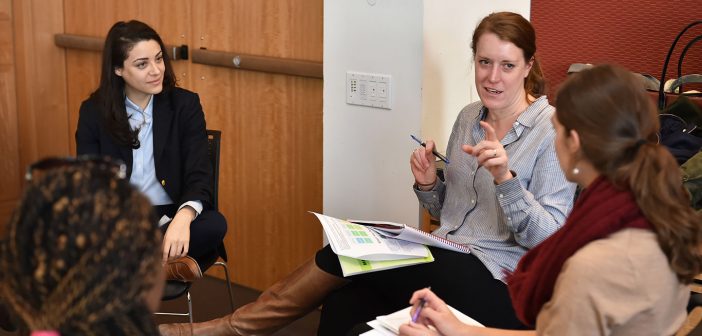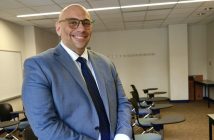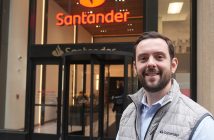Students in Fordham Law’s Advance Seminar in Public Interest Lawyering class were joined on Feb. 6 by unfamiliar faces: Graduate School of Education (GSE) students in counseling and psychology.
The GSE students were on hand to help their Lincoln Center campus peers interpret their results of Myers–Briggs Type Indicator (MBTI) self-scorable personality assessments, which the law students had taken the week before.
The personality assessment is used to help people better understand which aspects of 16 distinctive personality types describes them best—knowledge which can improve any group interactions. The law students have organized themselves into six teams and each group works collaboratively throughout the semester on a project with an outside public interest legal organization on issues such as the school-to-prison pipeline, student debt, homeless youth, and refugees. The seminar, the capstone academic requirement of the Stein Scholars Program, is team-taught by Fordham Law Professor Bruce Green, the Louis Stein Chair, and Sherri Levine, associate director of the Law School’s Stein Center for Law and Ethics.
Levine said the public lawyering class requires more problem solving, project management, and collaboration than most law classes. So five years ago, Green and Levine asked Margo Jackson, Ph.D., professor of counseling psychology in the GSE’s Division of Psychological and Educational Services, if she’d be willing to visit their law class to help students develop their collaborative team-building skills.
“Learning how to read a court case and spotting the issues are very important, but all of these other [team-building] skills are important too,” Levine said. “The sooner that’s recognized and the more opportunities you have to operationalize them, the easier it will be to become a versatile and skilled practitioner upon graduation.”
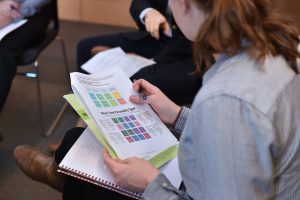
The MBTI assessment posits that people exist on a spectrum of behavior depending on the setting they are in, be it work, home, or school.
As the law students shared one another’s results—such as ENTJ (extraversion, intuition, thinking, judgment), INFP (introversion, intuition, feeling, perception), or ISTJ (introversion, sensing, thinking, judgment) – the GSE students helped them consider how to better understand their own and their group colleagues’ personality preferences in ways to collaborate effectively with their particular community social justice projects.
In previous years, Jackson has recruited students from her Psychology of Career Development class to join her; this year two master’s students and two doctoral candidates are assisting from her Career Strength Research Team. The key to these sessions, she said, is focusing on strengths, not deficits, that the legal team members bring to the group. That’s because research shows that the more diverse perspectives you have when it comes to problem solving, the better the product.
“What always strikes me when we do this [with the law students]is that my own students also find out the limits and the strengths of their own approaches to assessment and helping with others,” she said. “If you take the perspective that you’re the all-knowing savior, you’re only focusing on others’ weaknesses, and not on their strengths.”
Liat Zabludovsky, a GSE doctoral candidate, found the session to be a “formative experience” that forced her to think more deeply about her path in counseling psychology. The field is facilitative, rather than solely diagnostic, an aspect it shares with the MBTI assessment, which posits that people exist on a spectrum of behavior depending on the setting they are in, be it work, home, or school.
“Explaining counseling psychology versus clinical psychology, and why I chose it, to a group of people who are competent in completely different areas, was much more interesting than I expected,” she said.
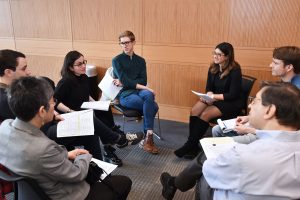
Fordham Law students Kenneth Edelson, Eva Schneider, Greg Manring, and Thomas Griffith discuss their results with a GSE student Christine Romano (top right), while Sherri Levine and Bruce Green look on.
Marcella Jayne, a second year law school student who scored as ENTJ, said that her team’s project, designing workshops to help students avoid crippling student debt from for-profit schools, will require the contribution of all team members.
Jayne said that, prior to getting the assessment results, she would have never thought of giving her teammates positive feedback. “To me, that would almost feel condescending,” she said.
But when one group member said ‘I need positive feedback, or I’m going to disengage,’ she realized that each team member has different needs to feel motivated to contribute.
“In team environments, we each walk in with our own expectations. We don’t usually have these open-ended, touchy-feely conversations about what we’re each expecting and what our assumptions are,” Jayne said. “The openness to say something like that is good.”
For Levine, working with the GSE is an exercise in practicing what they preach about the value of collaboration and teamwork.
“We think [teamwork]definitely will serve you well in your future careers, and here we are trying to do just that. We’re working in a team with another part of the university, and collaborating with persons who do very different types of work,” she said.
